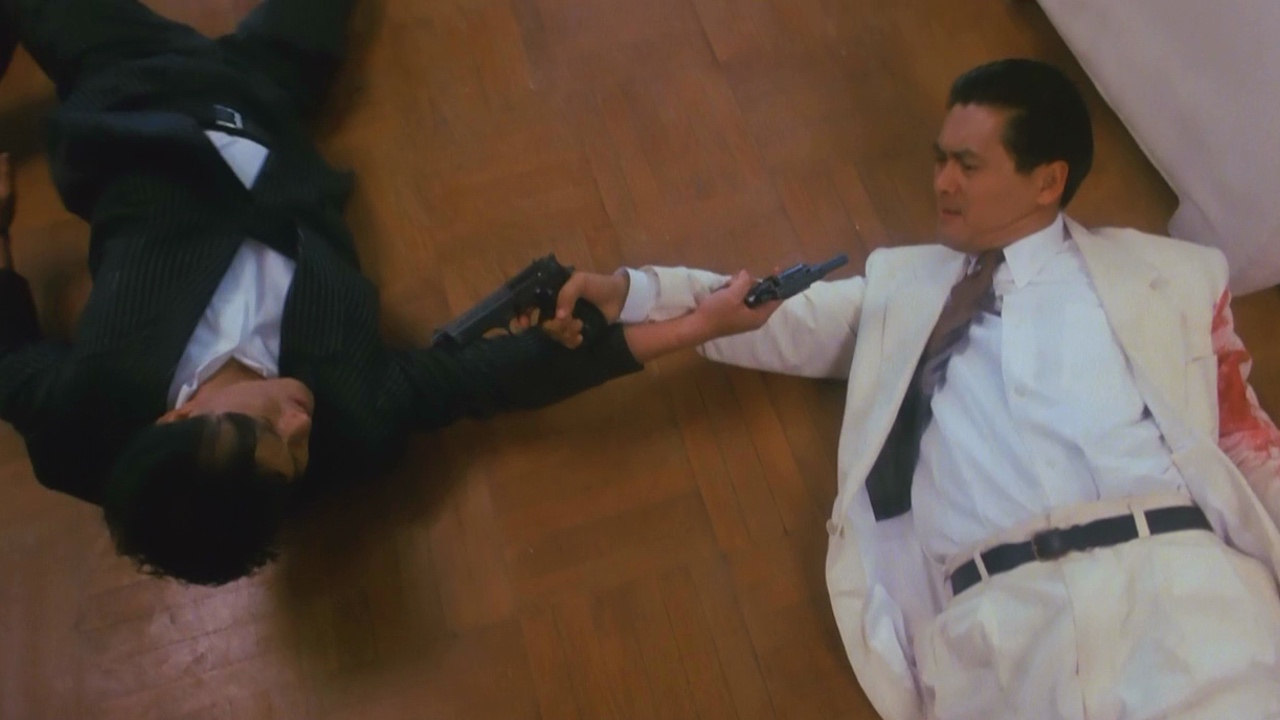John Woo’s films may be the paramount of action—the kinetic, Kantian awe of it all; the ridiculous surfeit of sparks and spray from hot lead colliding with metal and stone; shooting and reloading fetishized in slow motion; an endless storm of bullets blasting bodies that fly, fall, land slumped while heavenly doves drift across the sky promising peace in moments of violence, without a trace of irony. But it’s the unmatched earnestness with which he makes his melodramas about broken men in search of meaning and redemption that makes him a special filmmaker. The beauty of Woo is the lovingly astute depictions of male friendship (and male animosity transformed into friendship), the complexities that lead to profundities amid eruptions of death. Woo’s films are rooted in Hong Kong’s culture and cinematic language, specific and detailed, yet his global popularity and ineluctable (and too-short) tenure in big-budget Hollywood is all due to the universality of masculine camaraderie, fleeting and forever.
Woo released his first two movies, Dead Knot and Ouran, in 1968, but garnered global acclaim with A Better Tomorrow (starring a cool-as-hell Chow Yun-fat, Ti Lung, and Leslie Cheung) in 1986, 18 years into his career while at the still-young age of 40. It was with The Killer in 1989 (the year Indiana Jones and the Last Crusade topped the box office, followed closely by Tim Burton’s beautifully bizarre cultural phenomenon Batman) that Woo earned his status as Hong Kong’s—and the world’s—most magnificent director of action. Whereas James Cameron used cutting-edge technology and gargantuan budgets to manifest his vision of man’s relationship to machine, Woo is, despite his epic body counts, a humanist. He makes bloodshed balletic, and imbues his baroque scenes of whizzing bullets with life and ennui—it’s truly human action.
Bullet to the Head features what many Woo fans consider to be his best bromance, and Hard Boiled concerns two cops (Chow and Tony Leung Chiu-wai) who, after the imbroglio of undercover work is cleared up, come together in their twisty-turny trajectories, like two rivulets into the rapids, taking on an unlikely amount of bad guys with guns while exchanging clever and meaningful banter and blowing dudes away. The Killer is a melodrama propelled by male raillery and the desire for redemption, punctuated and propelled by shoot-outs, Woo’s most lyrical marriage of the male melodrama and beautiful action. It’s the tumult and power of male friendship that gives the film its soul. “Having faith is believing in something you just know ain’t true,” Mark Twain wrote in The Adventures of Huckleberry Finn, a story of the profound friendship of two American boys. Male friendship, the vulnerability of banter and heart-to-hearts of damaged men, men of morals that transcend the amorality of their vocations.
In The Killer, Chow is Ah Jong, a hitman with a heart who’s grown weary and morally stained by his violent vocation. In the fury of flying bullets, Ah accidentally nearly blinds a young woman (Sally Yeh), who needs surgery to regain her sight. Tormented by this tragic collateral damage, Ah sets out to redeem himself and save what’s left of her life—and what’s left of his soul. For half a year he watches her, a guardian not heaven- or hell-sent but truly, tragically human; he decides to do one last gig to help pay for her treatment with a high-ranking Triad boss as his target. It’s an impossible mission (foreshadowing Woo’s imminent involvement with Tom Cruise, who will never die, in movies or real life), but Ah is determined and more than capable. Detective Li Ying (Danny Lee) is hot on his trail, and soon the killer and the cop’s paths will converge, and they’ll find that their moral codes overlap more than you’d think. A friendship blossoms; blood flows.
Woo is, despite his epic body counts, a humanist. He makes bloodshed balletic, and imbues his baroque scenes of whizzing bullets with life and ennui—it’s truly human action.
Woo’s affinity for masculine relationships also propels his best American films. Face/Off, a monumental achievement in the emotional plight of the American man torn from his identity, is a rousing example and the most Woo-y of his American films. Of M:I 2, David Thomson said, trenchantly, that it’s our modern Chinatown—both were written by the late Robert Towne, but it’s Woo’s Hitchcockian ardor that’s most obvious in the emotional histrionics of the love triangle and danger that is literally apocalyptic in the threat of a supervirus, but more importantly an intimate threat of the heart, a vulnerability to Cruise’s unimpeachable hero, the commingling and tearing asunder of masculine identity, and the acknowledgement of sexuality—all of which are absent from subsequent entries in the series. The underrated Philip K. Dick adaptation Paycheck concerns Ben Affleck as a reverse-engineer tech wiz who’s betrayed by his best friend (Aaron Eckhart and his menacing chin, the only one that trounces Affleck’s) and, his memory having been wiped clean, must ascertain what happened in the two years that are lost to him, and why everyone wants him dead.
The Killer has a plethora of guns and gunfights, but it still jettisons the tropes of the Reagan-era American action movie, with all those buff manly men (who, despite their gratuitous muscles, never seem to have any sex) wielding comically large weapons, shooting, blowing stuff up, spitting out lame and endearing/enduring quips. As much fun—and as skillfully charming—as Arnold Schwarzenegger’s films are, they’re not often human (Kindergarten Cop being the most obvious exception). He is a superman. Chow is cool as hell as Ah, but the killer is flawed (he is a professional killer), and while we never doubt that he’ll succeed, we’re heartbroken by the end of the film, a dolorous and gorgeous conclusion that you don’t find in Hollywood’s versions of action. Except, of course, for Woo’s. FL







